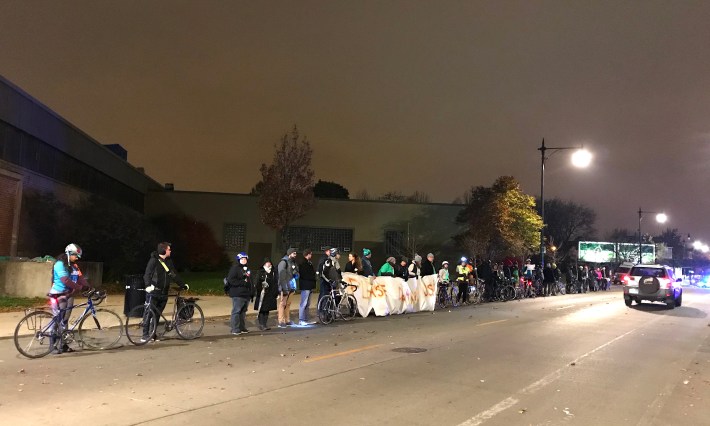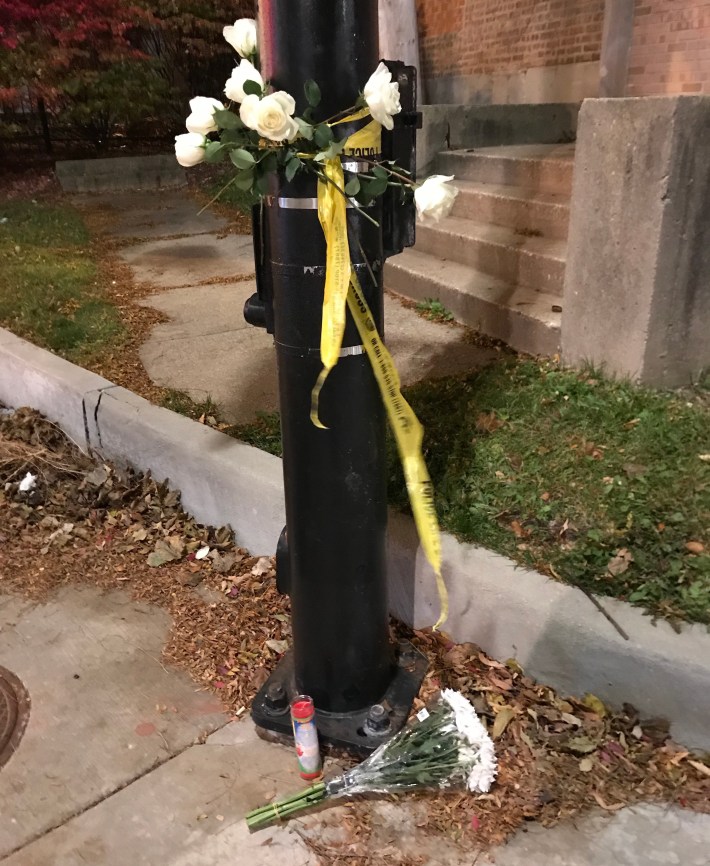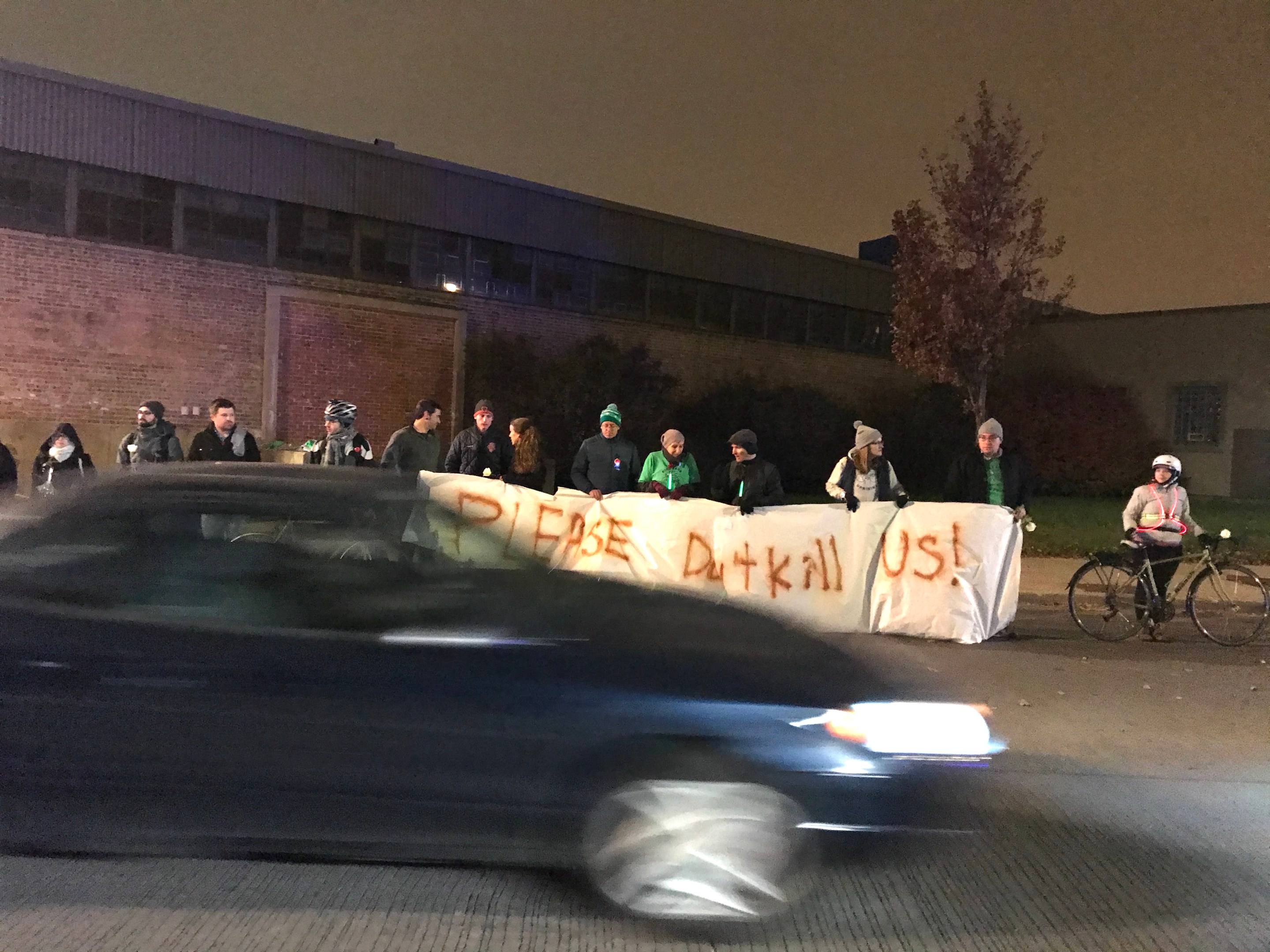Last night several dozen Chicago bike community members gathered at the site where school counselor Carla Aiello, 37, was killed on her bike by a trucker yesterday morning in the Old Irving Park neighborhood. They were there to honor the fallen cyclist and call attention to the need for safer conditions for biking by forming a "human protected bike lane" on Milwaukee Avenue.
According to Police News Affairs, Aiello, who lived northwest of the crash site in Norwood Park, was cycling southeast in a bike lane on Milwaukee yesterday morning at about 7 a.m. Aiello worked at Josephinum Academy of the Sacred Heart in Wicker Park. When she came to the intersection of Milwaukee and Kilbourn Avenue, the 41-year-old male driver of a dump truck failed to yield to her made a right turn, crushing her under his wheels. Aiello was pronounced dead at the scene. She is survived by her husband and two children.

A CBS Chicago report yesterday indicated that police were initially quick to absolve the driver of wrongdoing, stating “Police say the trucker had the right of way when he turned.” The report also stated, “Officers are calling this a tragic accident,” implying that there was no way the driver could have avoided killing Aiello. However, today News Affairs stated that the trucker was cited for negligent driving and making an improper right turn.
In the wake of the news yesterday, Christina Whitehouse from Bike Lane Uprising, a site that documents bikeway obstructions, quickly organized last night's vigil. Several dozen cyclists showed up at the crash site, located just north of Metra's Grayland station. The protestors held a large banner that read "Please Don't Kill Us!"
The buffered bike lanes on this stretch of Milwaukee were striped about three years ago. The project involved removing car parking from the west side of the street to make room for the lanes. (68 spots were later added at the west side of the station.) But the bike lane is now faded to near invisibility near the crash site.
At the vigil, Whitehouse said she wanted the event to draw attention to the fact that the bike lanes in this stretch are not protected and the paint is nearly gone. "We wanted to do something to memorialize the cyclist that was killed today as well as draw attention to the issue of unsafe bike lanes... I wanted the family and friends of [Aiello] to know that there is a community of cyclists that care about what happened." She said the response from bystanders had been very positive, with many motorists beeping their horns and waving in support.

"I'm here because this could have been me," said Anna Schibrowsky, a freelance writer who lives in Bridgeport and commutes by bike regularly. In 2016 as she rode a Divvy bike to the Orange Line on her way to work, a reckless driver struck her near Archer Avenue and Halsted Street, fracturing here elbow, which required multiple surgeries, including a joint replacement, and ten months of physical therapy. "I wanted to come out and make people aware that we need safer streets for bicyclists, scooter riders, skateboarders, everyone who's outside of a big metal [box.]"
"I wanted to come out and pay my respects," said Charlie Wence, a civil engineer who lives in Old Irving. He said he typically avoids riding on Milwaukee, but as a diagonal street it's the quickest route to neighborhoods like Logan Square and Bucktown. "If this happened to me on my bike, I would want people to do something like this for me."
Many ways to prevent tragedies like this, including:
— Active Trans (@activetrans) November 7, 2019
1. Dedicated Safe Streets Fund in city budget for infrastructure on high-crash corridors
2. Stricter requirements for safety mirrors + sideguards on large commercial vehicles
3. Limits on truck traffic
4. Limiting right turns
In 2012 Cassidy worked with Active Trans to sponsor Illinois legislation requiring convex mirrors for the front of all large Illinois-licensed trucks. However, the Illinois Trucking Association balked at the $500-per-vehicle cost, and testified against the bill, and the legislation died in committee.
In July 2017 Chicago’s City Council passed a new ordinance requiring that any business with a city contract worth $2 million or more install side guards — hardware that helps prevent pedestrians and cyclists from going under the wheels — and convex mirrors on all trucks used to fulfill the contract that weigh 10,000 pounds or more. However, the law probably didn't apply to the midsize truck from Aiello's crash.

Today Cassidy offered to meet with Active Trans to strategize, and perhaps revisit the topic of truck safety gear legislation in a meeting with the Illinois Department of Transportation.
Another strategy that could help prevent this kind of fatality would be legalizing the "Idaho stop," allowing cyclists to treat a red light like a stop sign, which has been legal in Idaho for years and was legalized in Arkansas in April. According to some news reports, the trucker who killed Aiello was stopped at the intersection with a red and made the turn after the light turned green. The Idaho stop allows cyclists to get out of the way of right-turning motorists by leaving the intersection before the light changes.
A 2007 report from the U.K. found that female cyclists in London were much more likely to be fatally struck by turning truck drivers than men, apparently because women were more likely to obey traffic signals and get caught in the drivers’ blind spots. That's one of the reasons that a 2016 study by DePaul University recommended that Chicago look into legalizing the Idaho stop. Aiello was at least the fifth female or gender-nonconforming cyclist killed by a turning truck driver in Chicago since summer 2016.
There are many options on the table to help prevent other families from experiencing the heartache that Aiello's loved ones are surely going through right now. Our leaders have a moral obligation to learn from this case and take action to save lives, so that something positive can come out of this tragedy.





